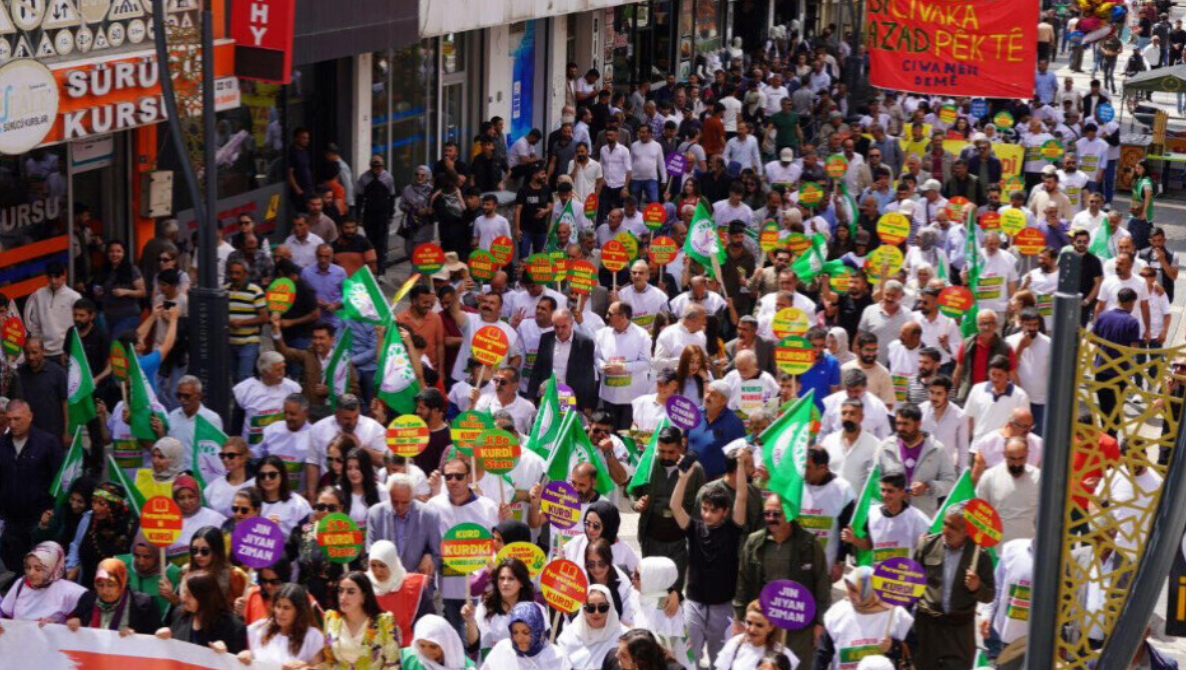Thousands of Kurdish citizens from across eastern Turkey marched from Ishaq Pasha Palace to Ahmad Khani’s tomb in Agri province, demanding formal recognition and educational rights for the Kurdish language. Organized by leading Kurdish language organizations including DEM Party, DIBEP, and Tejeya, the demonstration highlighted decades of linguistic suppression and called for constitutional recognition of Kurdish cultural identity.
Massive Turnout from Kurdish Regions Across Turkey
Citizens from Van, Agri, Kars, Muş, Erzurum, Bitlis, Iğdır, Ardahan, and numerous other Kurdish-populated cities in Turkey participated in Tuesday’s march., ANF reported. Demonstrators carried banners declaring “A free language creates a free society” and “Kurdish status, Kurdish education” as they processed through the streets. Local residents showed solidarity by playing traditional Kurdish music and applauding from their balconets, creating an atmosphere of cultural celebration despite the serious political message.
The march route held symbolic significance, beginning at the historic Ishaq Pasha Palace and culminating at the tomb of Ahmad Khani, the renowned 17th-century Kurdish poet and intellectual. This choice emphasized the deep historical roots of Kurdish literary tradition and the community’s determination to preserve their linguistic heritage for future generations.
Political Leadership Addresses Historical Suppression
Speaking at Ahmad Khani’s tomb, Dilbehar, co-spokesperson for the DEM Party’s Language and Culture Commission, delivered a powerful address highlighting the historical resistance of the Kurdish language against systematic suppression policies. “The policies aimed at eliminating the Kurdish language have completely failed,” Dilbehar declared, referencing decades of restrictions on Kurdish language use in Turkey.
The political leader also emphasized the connection between language rights and the broader peace process, specifically referencing the peace message and mother tongue advocacy of imprisoned PKK leader Abdullah Öcalan. Dilbehar called for an end to isolation policies, stating that linguistic rights cannot be separated from overall democratic reforms and peaceful resolution of the Kurdish question.
“Claiming ownership of language means claiming ownership of all humanity,” Dilbehar explained. “If we speak of peace, all isolation policies against the respected Öcalan and the Kurdish people must be ended.” This statement connected language preservation directly to political negotiations and democratic dialogue processes.
Comprehensive Demands for Kurdish Language Rights
The demonstration presented a detailed set of demands addressing various aspects of Kurdish language recognition and implementation. Dilbehar outlined four primary requirements that organizers believe are essential for genuine linguistic equality and cultural preservation.
First, the speakers demanded that Kurdish be recognized as an official language with equal legal status alongside Turkish. This would fundamentally change the constitutional framework and provide legal protection for Kurdish language use in government, courts, and public institutions.
Second, they called for Kurdish to be established as the language of education from primary school through university level. This represents a dramatic expansion from current limited Kurdish language programs, envisioning comprehensive education delivered in the mother tongue rather than as a foreign language subject.
Third, the movement demanded an end to restrictions on Kurdish names for children, businesses, and geographic locations. Current regulations limit the use of Kurdish nomenclature, which activists argue represents cultural erasure and denial of basic identity rights.
Fourth, speakers insisted that Kurdish language, geography, and culture must be constitutionally recognized within the country’s legal framework. This would provide permanent protection against future policy reversals and establish Kurdish cultural identity as an integral part of Turkey’s national heritage.
The demonstration concluded with a community appeal emphasizing grassroots language preservation efforts. “Our call to all Kurdish people and institutions is to intensify their struggle for the mother tongue,” organizers stated in their final declaration. “The Kurdish people must be united regarding their mother tongue. If the Kurdish language does not survive, the Kurdish people will not survive either.”
The movement urged families to take personal responsibility for language transmission, declaring that “every home must become a school” for Kurdish language instruction. This grassroots approach recognizes that formal recognition alone cannot guarantee language survival without active community engagement and intergenerational transmission.
The march ended with participants chanting “Long live the Kurdish language,” symbolizing both celebration of their linguistic heritage and determination to continue advocating for official recognition and educational rights.


